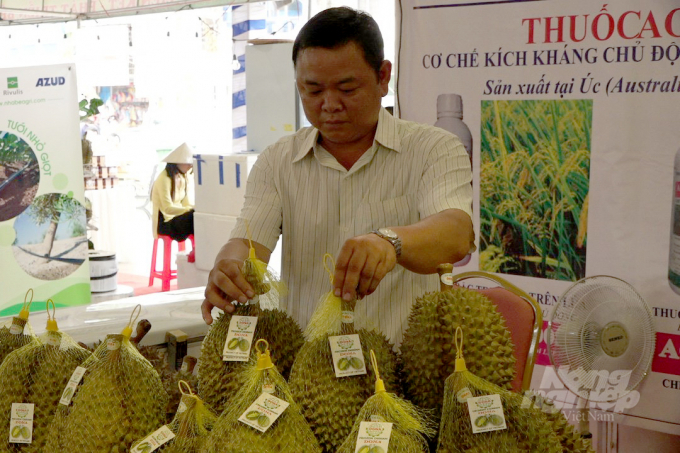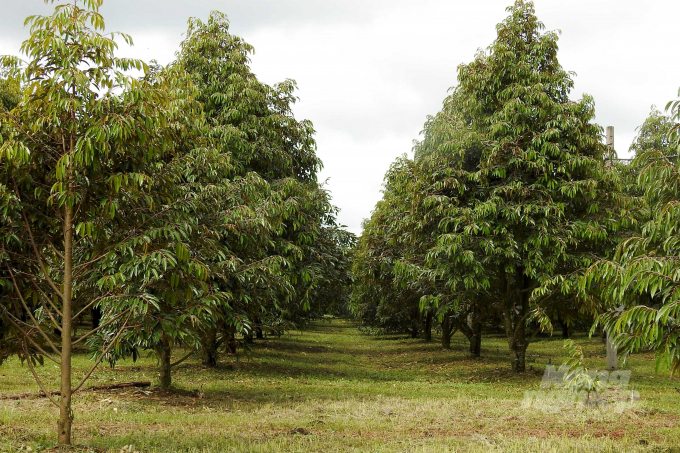June 20, 2025 | 01:09 GMT +7
June 20, 2025 | 01:09 GMT +7
Hotline: 0913.378.918
June 20, 2025 | 01:09 GMT +7
Hotline: 0913.378.918

Dona durian products have not dropped in price over the past 20 years because they always ensure quality. Photo: Thanh Son.
According to a foreign study, the international durian market in 2018 has an estimated scale of 17.6 billion USD and is forecast to reach over 28 billion USD in 2025.
As a result, the international durian market is thriving when this fruit is dubbed the "king of fruits" in many East Asian and Southeast Asian markets.
China is the world's largest durian import market, with an annual growth rate of 16%. In the first 11 months of 2021, China imported over 800,000 tons of durian, which is equivalent to at least 4.1 billion USD.
Located immediately next to such a large market, Vietnamese durians are still viewed as inferior to Thai and Malaysian durians due to the previous lack of official export to the Chinese market.
Mr. Nguyen Phu Cuong, Director of Dona - Techno Biotechnology Development Joint Stock Company, said that Thailand and Malaysia developed durian nearly 20 years ahead of Vietnam.
20 years ago, Thailand officially exported durian to different countries around. On the other hand, Vietnam has only been officially licensed to export fresh durian to China.
Therefore, China opening the market for Vietnamese durian can prove to be both a good opportunity as well as a great challenge for durian exporting businesses, and local durian farmers.
According to Mr. Nguyen Phu Cuong, as a country gets progressively wealthier over time and as the people of that country consume more products, there will be more consumers who are interested in healthy products. The same is also true for the Chinese market. The fact that the Chinese market is becoming increasingly strict and difficult means that if Vietnam can manage to export to China, we will also be able to export to other countries.
According to Mr. Cuong, in order to compete with Thai and Malaysian durian in the Chinese market, Vietnamese durian must have a solid foundation. And to build such foundation, durian must first be standardized in terms of quality.

Dona-Techno's model durian farm. Photo: Thanh Son.
Durian farmers currently retain the habit of cultivating large and heavy durian fruits, thinking that they will be more profitable to sell to traders. However, big and heavy durians often mean that the fiber contents are too high, the skin is too thick, the sweetness level is low, and the unique aroma is lacking.
Meanwhile, when durian farmers in Thailand and Malaysia notice that the grown durians are oversized or overweight, they will cut off the fruits and dispose according to the principle that any durian that fails to meet the requirements in terms of size and quality cannot be left on the tree nor be put on sale. They only sell durians that meet quality standards.
Consequently, Mr. Cuong said that the Ministry of Science and Technology and the Ministry of Agriculture and Rural Development need to study, develop and issue a set of standards for durian. In addition, it is necessary to develop a standard farming process to ensure that durian fruits are uniform in shape, stable in quality as well as meet the food safety criteria.
Mr. Cuong affirmed that if Vietnamese durian farmers know how to control and manage, producing and selling only durians of high quality, Vietnamese durians can reliably compete in the Chinese market and other global markets as well.
Furthermore, it is necessary to have close coordination between state agencies, businesses, cooperatives, among others in the monitoring of durian farms. This is to ensure that durian products exported by businesses will meet all requirements regarding food safety and quality standards.
The linkage between different stakeholders is an important factor in bringing durian to the Chinese market in an official as well as stable and sustainable manner. Farmers and producers alone cannot export Vietnamese durians through the official channel; they must coordinate with businesses and the government, thereby ensuring that each farmer household will produce the appropriate product for the Chinese market.
Dona-Techno has set the standard for the company's Dona durian product. Accordingly, the standard Dona durian weighs from 2.5 to 4 kg. Thanks to its high and stable quality, Dona durians have never dropped in price over the past 20 years. Dona - Techno has registered the Dona durian trademark in many markets and has been accepted by 6 markets so far including the US, China, India, Korea, Japan and the Middle East.
Translated by Nguyen Hai Long
/2025/06/17/3942-2-143243_548.jpg)
(VAN) Recently, in Sweden, the Secretary of the Binh Dinh Provincial Party Committee presented the Investment Registration Certificate for the 'Polyester Fabric Recycling Complex' project to SYRE Impact-AB Company.
/2025/06/12/3721-2-202745_83.jpg)
(VAN) TH made an impression at Seoul Food 2025 with its line of natural beverages, paving the way for Vietnamese food products to enter the South Korean market.

(VAN) Soc Trang's success in rice exports stems from a strategy of developing fragrant and specialty rice cultivation areas and standardizing production toward low-emission practices.
/2025/06/11/1311-5-120811_839.jpg)
(VAN) The pig farming industry is facing the challenge of comprehensive restructuring to meet requirements for quality, safety, traceability, and market expansion both domestically and for export.

(VAN) Vietnam considers participating in ALGROALBA in order to expand agricultural production, coordinate the assessment and effective exploitation potential land.
/2025/06/05/5314-1-184727_407.jpg)
(VAN) From seemingly worthless fish scales and skin, enzymes and lactic ferments can transform by-products into peptides, opening a sustainable, effective business direction and elevating Vietnamese seafood.

(VAN) TTC AgriS and IFC signed a strategic partnership to develop a sustainable agricultural value chain, aiming to achieve the Net Zero target by 2035.